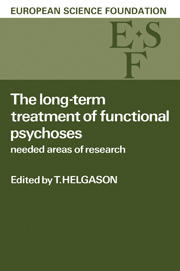Book contents
- Frontmatter
- Contents
- List of Participants
- Introduction
- I Organisational Aspects of Long-term Treatment
- II Patients Aspects of Long-term Treatment
- Needed are as of research in psychological treatments for functional psychoses
- Family therapy as part of the treatment of schizophrenia
- Milieu therapy in the long-term treatment offunctional psychoses: needed areas of research
- Long-term treatment of functional psychosis with neuroleptics
- Lithium and prophylaxis in manic-depressive illness
- New perspectives in psychopharmacology
- Research implications of recent trends in the treatment of schizophrenia
- Long-term treatment of functional psychoses in childhood and adolescence
- Functional psychosis in old age
- Chronicity and hospitalization: can the viciouscirclesbe broken?
- Social network and the long-term course of mental disorders - research needs
- III Public Health Aspectsof Long-term Treatment
- Index
Social network and the long-term course of mental disorders - research needs
from II - Patients Aspects of Long-term Treatment
- Frontmatter
- Contents
- List of Participants
- Introduction
- I Organisational Aspects of Long-term Treatment
- II Patients Aspects of Long-term Treatment
- Needed are as of research in psychological treatments for functional psychoses
- Family therapy as part of the treatment of schizophrenia
- Milieu therapy in the long-term treatment offunctional psychoses: needed areas of research
- Long-term treatment of functional psychosis with neuroleptics
- Lithium and prophylaxis in manic-depressive illness
- New perspectives in psychopharmacology
- Research implications of recent trends in the treatment of schizophrenia
- Long-term treatment of functional psychoses in childhood and adolescence
- Functional psychosis in old age
- Chronicity and hospitalization: can the viciouscirclesbe broken?
- Social network and the long-term course of mental disorders - research needs
- III Public Health Aspectsof Long-term Treatment
- Index
Summary
Background
The study of the role of the social network in the course of mental disorders is a relatively new research challenge. The possibility of rehabilitating in the community mental patients who would otherwise spend their whole lives in psychiatric hospitals, has only emerged in the last few decades, mainly as a result of the introduction of neuroleptic drug treatment. Initially the concept of rehabilitation was, and in fact frequently still is, focussed on vocational rehabilitation; until recently, little attention has been paid to reintegrating a patient into his natural social environment.
The patient's social relationship in the community became an issue for research workers only after the phenomenon of’ revolving door psychiatry' had become apparent. The question was raised as to whether the early return of the mental patient to the psychiatric hospital was due to poor social integration or to life stress (Brown & Birley, 1968). However, the commonsense assumption that integration into a network of social relationships is an indicator of successful adaptation, since the support given by such relationships is protective, could only partially be substantiated (Henderson, 1983). It is true that having social relationships may reduce stress, strengthen the patient's ability to cope with stress or decrease the probability of relapse by enhancing the patient's compliance with medication; however, it is frequently overlooked that social connections make demands, create constraints, engender stress and impose pressure on one's opinions, attitudes and general life style (Hammer, 1981).
The study by Brown, Birley & Wing (1972; seealso Vaughn & Leff, 1976) highlights the stressful aspects of social relationships: schizophrenic patients living in ‘high expressed emotion’ families had higher relapse rates than those living in ‘low expressed emotion’ households. Furthermore, while it is also true that the larger the number of social relationships the greater the possibility of a buffering effect of the social network in the face of adverse experiences, it is also true that a larger number of social relationships increases the possibility of life events associated with the disruption or distortion of network relationships.
Hence, this double-sidedness of social relationships has to be kept in mind when carrying out research in this field.
- Type
- Chapter
- Information
- The Long-Term Treatment of Functional PsychosesNeeded Areas of Research, pp. 163 - 174Publisher: Cambridge University PressPrint publication year: 1985

